Best
Light Gauge String
-
Overall: Lightest possible string tension and greater freedom while playing
-
Best Feature: Exceptional build quality, lassting longer than average strings
-
TedScore™: 9/10
Best
Medium Gauge String
-
Overall: Tight lows and crisp highs for powerful leads and smooth feel for comfortable
-
Best Feature: Durable construction for robust playin
-
TedScore™: 9/10
Best
Heavy Gauge String
-
Overall: Great sound when playing chords and single notes.
-
Best Feature: Retains tension even when tuning down to lower notes
-
TedScore™: 9/10
Changing your guitar’s string gauge isn’t a dull alteration; it’s like discovering a treasure trove of musical wonders and fresh experiences.
And the best part? It’s one of the easiest and most affordable ways to transform your musical journey!
In this article, we’ll discuss everything you need to know about string gauges, from how they work and the types of strings available to their impact on tone and playability.
We’ll also help you determine the best gauge for electric guitar strings to get you started.
Understanding the Importance of Gauge for Electric Guitar Strings
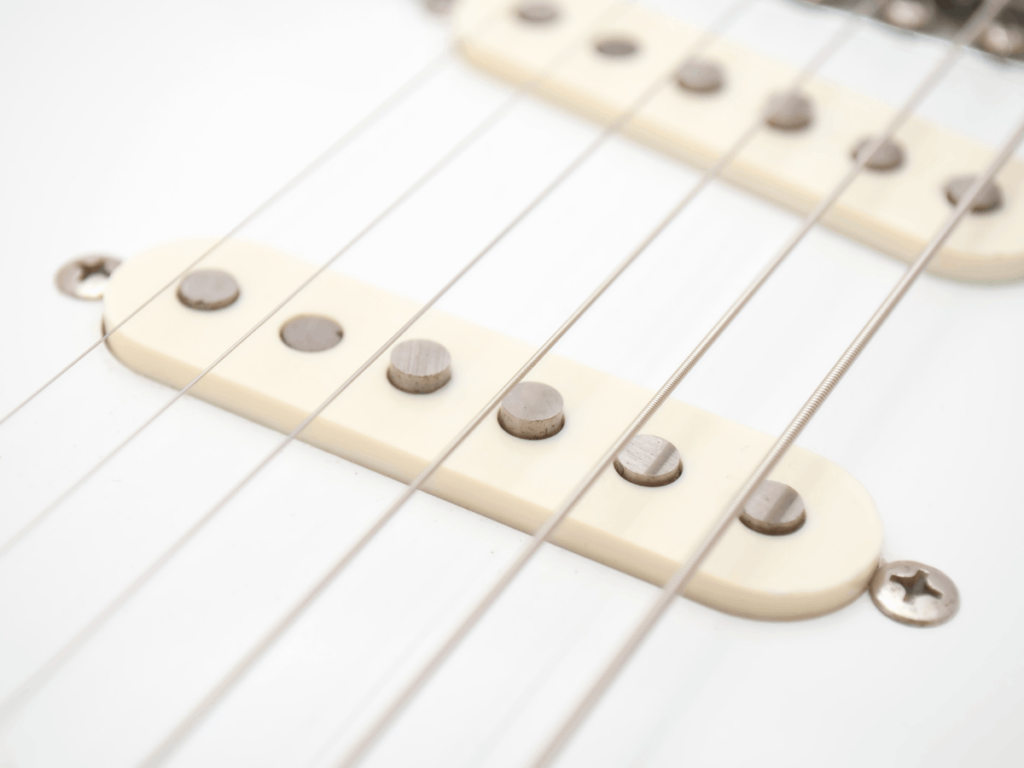
Understanding the importance of gauge for electric guitar strings is key to unlocking your instrument’s full potential. Gauge (or “string size”) refers to the thickness of a string, and it impacts numerous aspects of sound and playability.
Different gauges produce different levels of neck tension, affecting everything from sustain to intonation. It also affects the overall sound: heavier gauges are brighter, while lighter gauge strings have a rounder tone.
Gauge is typically expressed in thousandths of an inch and will vary depending on the type of string material (steel, nickel, or other metal). The thicker the string, the higher the gauge—so a .009 gauge string will be thinner than a .010.
Different string gauges may be more appropriate depending on the type of guitar (acoustic or electric) and individual playing style. Generally, electric players prefer either 9 or 10-gauge strings, while acoustic guitars use 12-gauge strings. However, it’s important to note that many variations are available in both categories.
Light Gauge Electric Guitar Strings
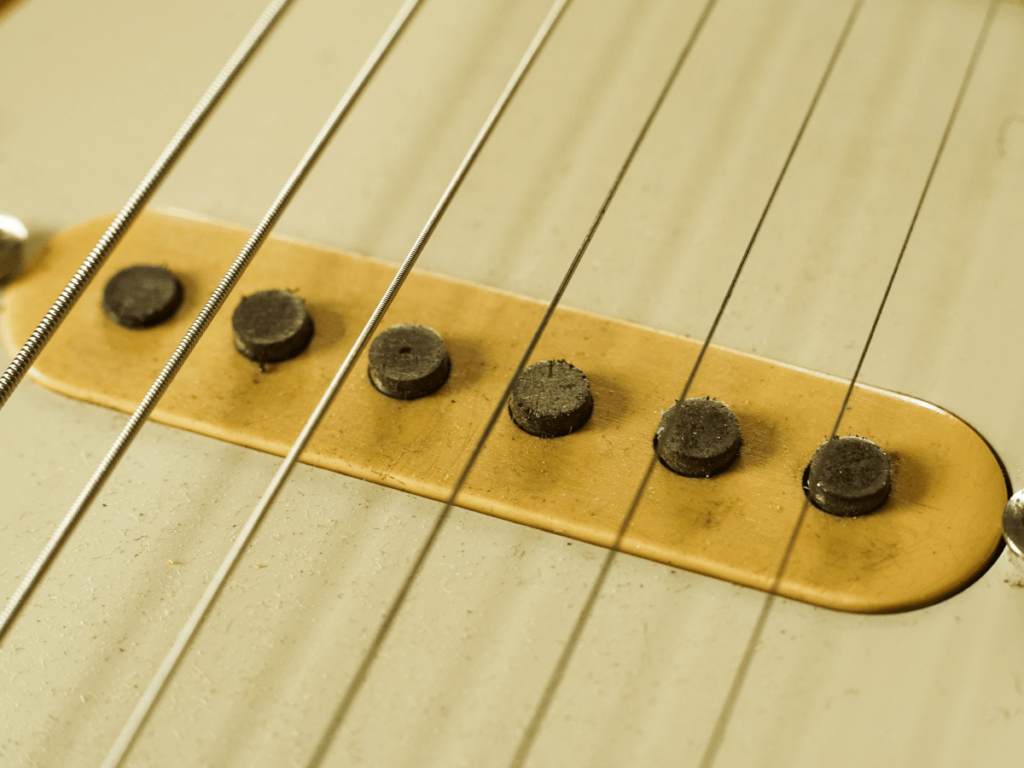
Light gauge electric guitar strings are the most popular string set many musicians use. These strings offer a clear and bright sound, with less tension on the neck and frets of the instrument.
The light gauge strings range from 8-gauge to 9-gauge, with an 8-gauge (e.g., 8-38) being the least thick and a 9-gauge (e.g., 9-42) being the most common guitar string set.
Music Genre Best for Light Gauge
The 8-gauge set, known as a “super light” set, is best for players who like to play with fast and loose techniques such as blues, jazz, country, and folk. The 8-gauge strings are also popular with some classical guitarists due to their lightness and playability.
The 9-gauge strings, known as a “light” set, are the most popular among electric guitarists. These strings offer an outstanding balance between brightness and tension without causing discomfort on the fingerboard or neck of the instrument.
This string set is ideal for those requiring moderate amounts of distortion while maintaining clarity and articulation in their playing.
- Easy to install
- Reduce finger fatigue
- Suitable for beginners who are just starting guitar playing
- Easy to bend notes and chords
- Strings vibrate more freely, resulting in better tone and resonance
- Greater sustenance of notes due to less tension
- Less sustain than heavier gauges
- More prone to breaking due to the lighter material
- Not as suitable for heavy distortion or thick tone production
- Excessive ease of bending may lead to unwanted bends or slips
Our Recommended Light Gauge Strings

FEATURES: Nickel
OTHER INFO: Gauge: .007, .009, .011, .020w, .030, .038
Dunlop R.Willy Electric Guitar Strings Extra Light
When you check the price above, you’ll see there are loads of great places to buy this item. Our personal favorite is Gear4music.
It is the largest music retailer in the UK and fast becoming the most respected online music shop in the US too. Their customer service is excellent, they have competitive prices, really fast shipping, and usually have the longest guarantee.
Most professional musicians use Gear4music, so there is no reason why you shouldn’t too!
- Rich articulation and punchy tone.
- Smooth, silky feel for seamless performance.
- Perfectly balanced for high-speed picking and soaring leads.
- Durable design ensures the strings will last longer and maintain their feel.
- Not suitable for those seeking a darker or heavier tone.
- Lighter strings may require extra attention when tuning.
The professional musician who wrote this article combined many things,
from the product build, manufacturer’s reputation through to feedback
from other users, to create our famous TedScore™.
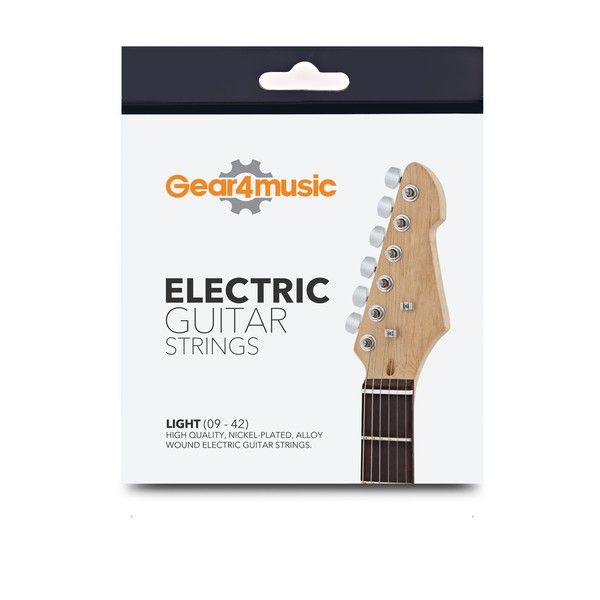
FEATURES: Superlight stainless steel nickel alloy
OTHER INFO: Gauges: 9, 11, 16, 24, 32, 42
Electric Guitar Strings by Gear4music
When you check the price above, you’ll see there are loads of great places to buy this item. Our personal favorite is Gear4music.
It is the largest music retailer in the UK and fast becoming the most respected online music shop in the US too. Their customer service is excellent, they have competitive prices, really fast shipping, and usually have the longest guarantee.
Most professional musicians use Gear4music, so there is no reason why you shouldn’t too!
- Very competitive price
- Long-lasting and durable
- Bright tone and clear sound
- Perfect fit for most vintage-style instruments
- Inconsistent string quality
- Limited tonal options for specific genres/styles
The professional musician who wrote this article combined many things,
from the product build, manufacturer’s reputation through to feedback
from other users, to create our famous TedScore™.

FEATURES: High Carbon Steel Alloy Design
OTHER INFO: Plain Steel Gauges: .008, .010, .015 and Nickel Wound Gauges: .021, .030, .038
D'Addario NYXL0838 Nickel Wound, Extra Super Light
When you check the price above, you’ll see there are loads of great places to buy this item. Our personal favorite is Gear4music.
It is the largest music retailer in the UK and fast becoming the most respected online music shop in the US too. Their customer service is excellent, they have competitive prices, really fast shipping, and usually have the longest guarantee.
Most professional musicians use Gear4music, so there is no reason why you shouldn’t too!
- Lightest possible string tension
- Greater freedom while playing
- Unmatched tuning stability
- Exceptional build quality
- Lasting longer than average strings
- Clean and bright tones with excellent projection
- May require more finger strength
- Can have a higher cost compared to traditional strings
The professional musician who wrote this article combined many things,
from the product build, manufacturer’s reputation through to feedback
from other users, to create our famous TedScore™.
Medium Gauge Electric Guitar Strings

Medium gauge electric guitar strings are the perfect compromise between sound and tension. These strings provide a clear, punchy sound with the right amount of tension on the neck and fingerboard for improved intonation.
The medium gauge range can be found in 10-gauge (e.g., 10-46) to 11-gauge (e.g., 11-50).
Music Genre Best for Medium Gauge
Medium gauge strings are the go-to choice for most genres of electric guitar playing, from blues and rock to jazz and metal. They offer fantastic versatility, allowing you to switch between clean tones and lead sounds without compromising sound quality.
The 10-46 gauge is probably the most popular set of medium gauge strings as it offers enough tension for slicker playing styles while still providing a full-bodied tone.
- Great all-around sound that works for many genres
- Less prone to fretting out than heavy gauge strings
- Tension is balanced between light and heavy gauges, making them easier on the fingers
- Good sustain with clear attack and note separation
- Thicker strings provide a fuller, more powerful tone.
- Can be too light for some styles, such as heavy metal
- Tone may lack the power and crunch of heavier strings
- Not as bright as lighter strings
Our Recommended Medium Gauge Strings
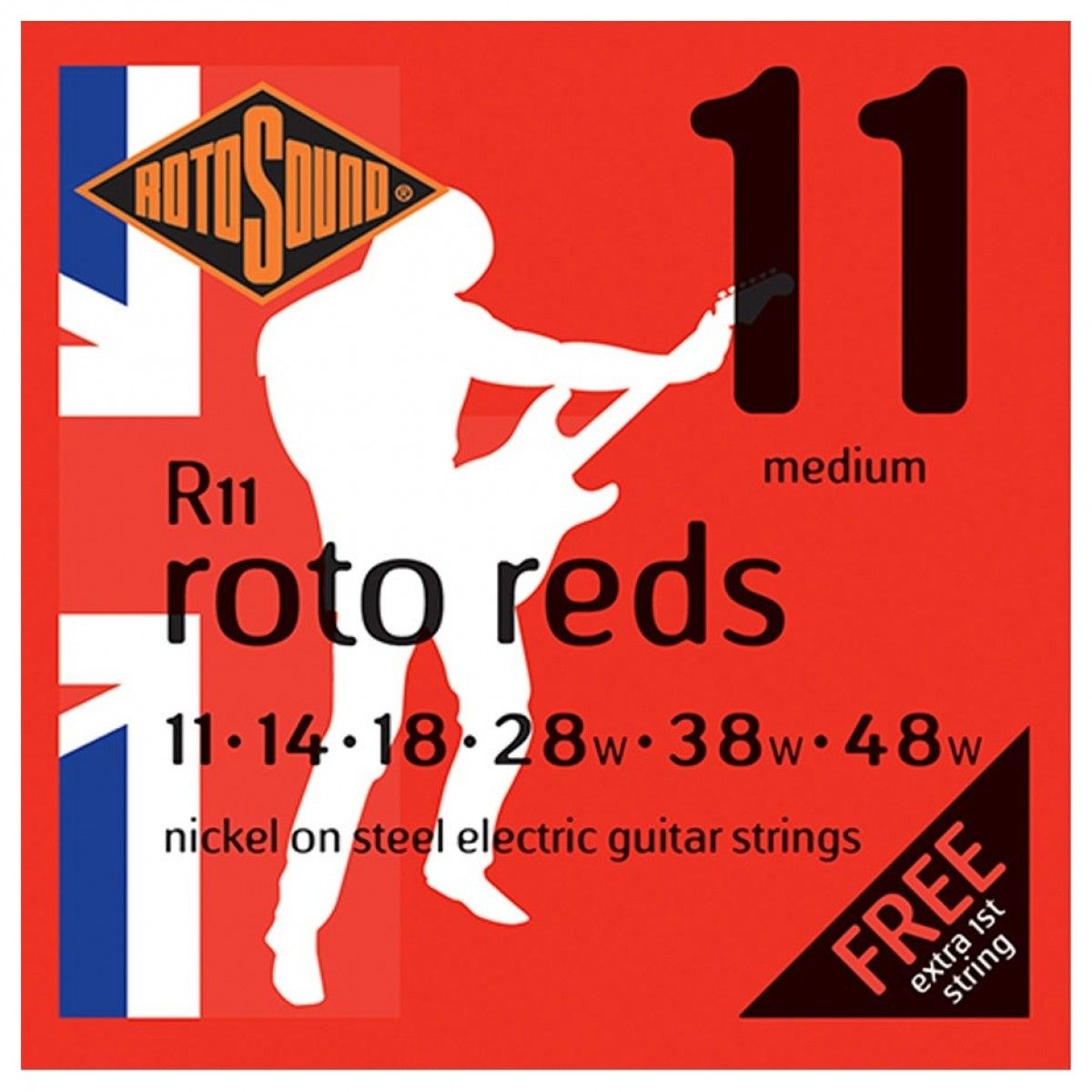
FEATURES: 11, 14, 18, 28, 38, 48 Gauges
OTHER INFO: Medium tension
Rotosound R11 Roto Red Electric Guitar Strings
When you check the price above, you’ll see there are loads of great places to buy this item. Our personal favorite is Gear4music.
It is the largest music retailer in the UK and fast becoming the most respected online music shop in the US too. Their customer service is excellent, they have competitive prices, really fast shipping, and usually have the longest guarantee.
Most professional musicians use Gear4music, so there is no reason why you shouldn’t too!
- Consistent quality and durability from the high-grade materials used.
- Playability is excellent, with comfortable tension and a balanced feel.
- The nickel-plated steel offers a classic British tone.
- Long-lasting strings are perfect for everyday playing.
- May be too light for some players
- Tone may not satisfy players seeking extra warmth or brightness
The professional musician who wrote this article combined many things,
from the product build, manufacturer’s reputation through to feedback
from other users, to create our famous TedScore™.

FEATURES: Steel
OTHER INFO: 6 strings – 10, 13, 17, 26, 36, 46 gauges.
Ibanez IEGS61 Electric Guitar Strings Set
When you check the price above, you’ll see there are loads of great places to buy this item. Our personal favorite is Gear4music.
It is the largest music retailer in the UK and fast becoming the most respected online music shop in the US too. Their customer service is excellent, they have competitive prices, really fast shipping, and usually have the longest guarantee.
Most professional musicians use Gear4music, so there is no reason why you shouldn’t too!
- Superior tone and durability
- Hexagonal steel cores for increased sustain and clarity
- Strong and flexible nickel wound strings
- Easy bending with ample volume and power
- Affordable pricing for musicians of all levels
- Breakage potential, if not properly maintained
- Not suitable for extreme bending.
- Lower notes may lack definition at high-volume levels.
The professional musician who wrote this article combined many things,
from the product build, manufacturer’s reputation through to feedback
from other users, to create our famous TedScore™.
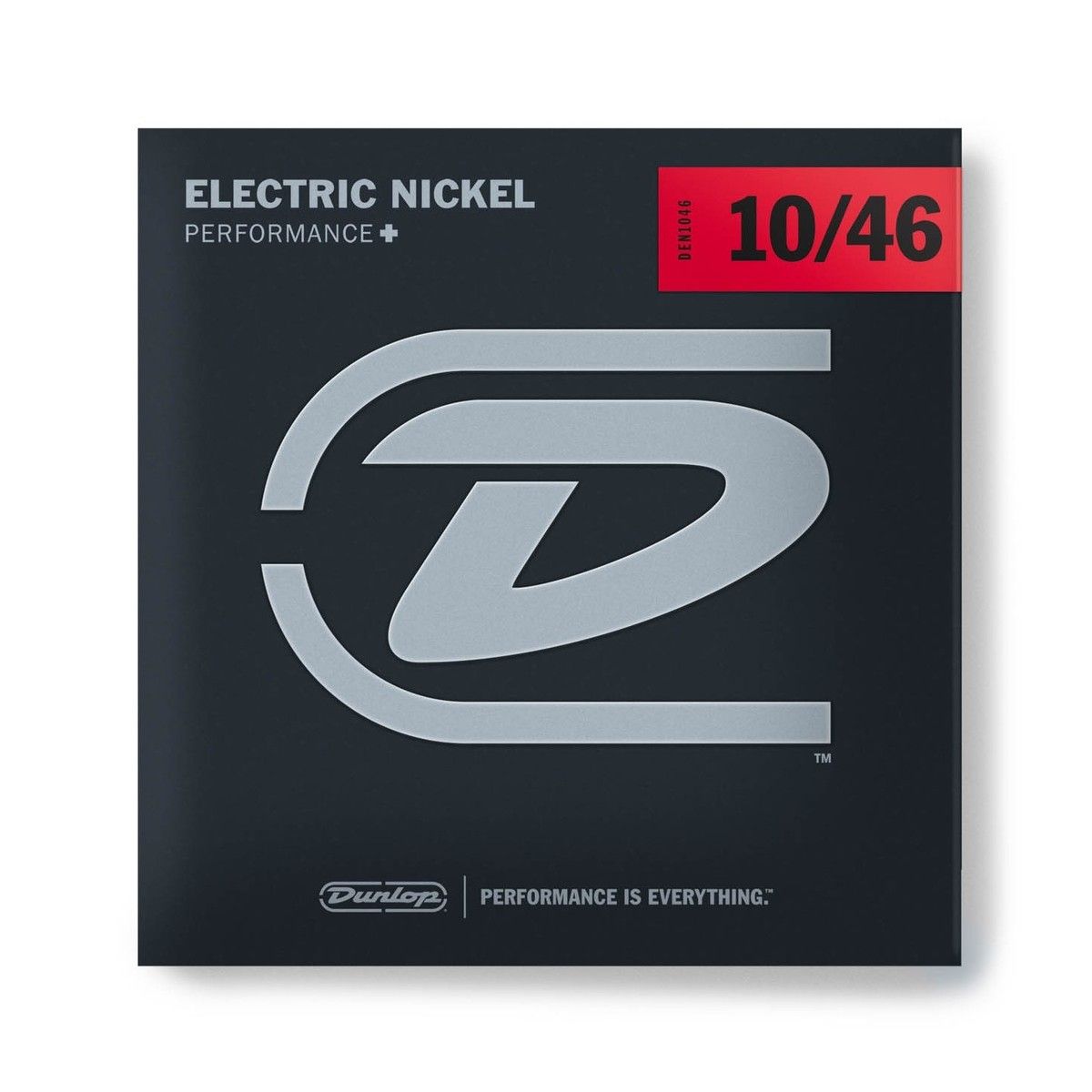
FEATURES: .10 .13 .17 .26 .36 .46 Gauge
OTHER INFO: Nickel Wound Material
Dunlop Electric Guitar Strings, Nickel Wound, Medium 10-46
When you check the price above, you’ll see there are loads of great places to buy this item. Our personal favorite is Gear4music.
It is the largest music retailer in the UK and fast becoming the most respected online music shop in the US too. Their customer service is excellent, they have competitive prices, really fast shipping, and usually have the longest guarantee.
Most professional musicians use Gear4music, so there is no reason why you shouldn’t too!
- Tight lows and crisp highs for powerful leads
- Durable construction for robust playing
- Balanced response for precision playing
- Smooth feel for comfortable playing
- Break in-period is quick
- May not be suitable for all styles of playing
- Tension may be too low for some players
The professional musician who wrote this article combined many things,
from the product build, manufacturer’s reputation through to feedback
from other users, to create our famous TedScore™.
Heavy Gauge Electric Guitar Strings
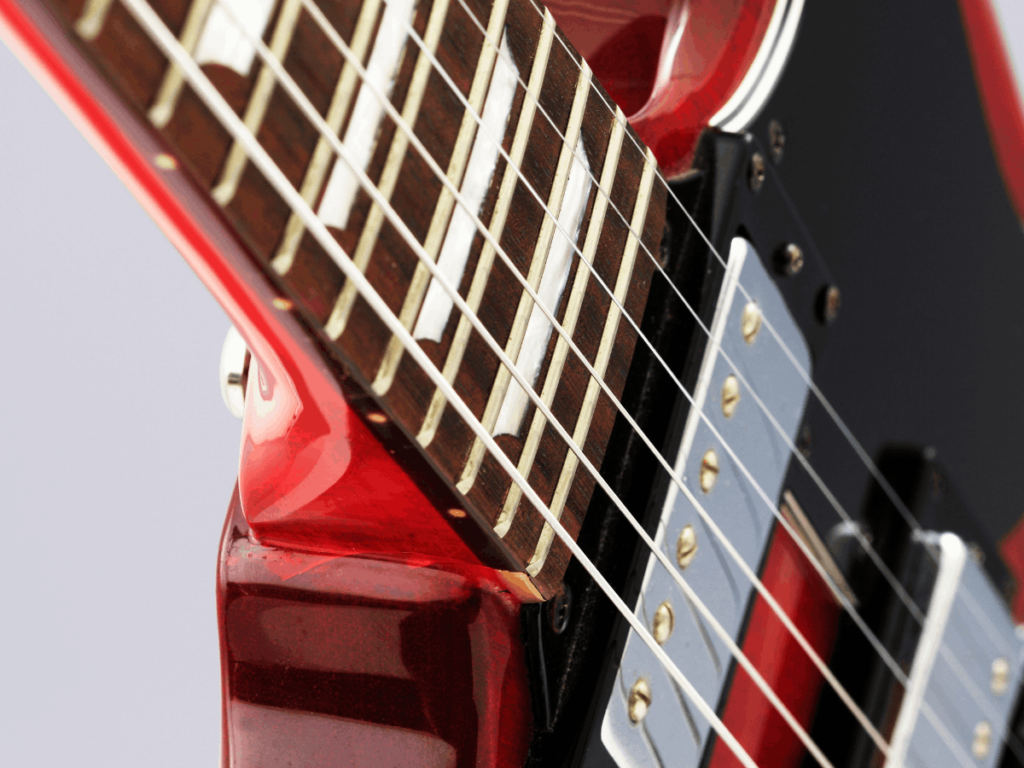
Heavy gauge electric guitar strings offer the most tension and punchy sound. These strings are thicker than the lighter gauges, ranging in thickness from 11 to 54. Commonly referred to as “heavy” sets, these strings are perfect for those who like a thick and responsive tone.
The lower gauges in this set are heavier and deliver a beefier tone, while the higher gauges offer more clarity and definition. The thickness of the strings ranges from:
Low E string: 0.054″, A string: 0.042″, D string: 0.030″, G string: 0.022″, B string: 0.015″ and High E string: 0.011″.
These strings offer a wide range of tone possibilities depending on the desired sound you’re looking to achieve.
Music Genre Best for Heavy Gauge
The heavy guitar string gauge offers clarity and sustains even when playing with distortion. This makes them ideal for players of metal, hard rock, punk, and pop music genres who require a thicker tone.
They also work well for complex chords and techniques that require stronger fingers to fret them properly.
- Increased low-end presence
- More resistant to bending out of tune due to increased tension
- Greater control during solos and complex chords
- Excellent for heavy distortion or thick tones
- Great for aggressive playing styles
- Improved stability and less string breakage
- Higher volume and a fuller sound
- Increased tension on the neck, which can cause fatigue and sore fingers
- Difficult to install due to thicker material
- Not suitable for every guitar or player
- Reduced top-end and brightness
Our Recommended Heavy Gauge Strings
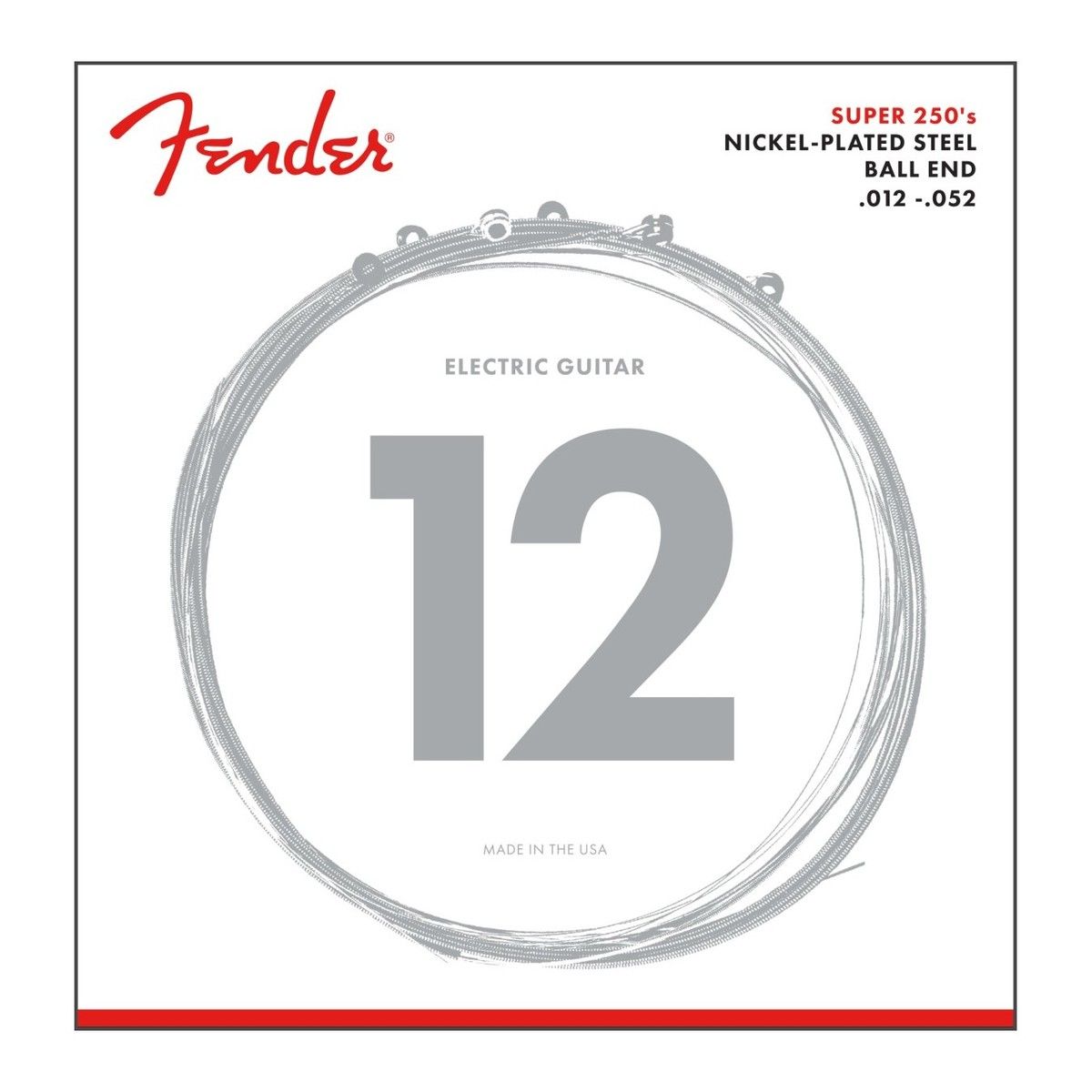
FEATURES: Nickel Plated Steel Construction
OTHER INFO: Ball End Design
Fender Super 250H NPS Guitar Strings, 12-52
When you check the price above, you’ll see there are loads of great places to buy this item. Our personal favorite is Gear4music.
It is the largest music retailer in the UK and fast becoming the most respected online music shop in the US too. Their customer service is excellent, they have competitive prices, really fast shipping, and usually have the longest guarantee.
Most professional musicians use Gear4music, so there is no reason why you shouldn’t too!
- High output, dynamic sound
- Silky smooth feel for rock and blues playing
- Expresses individuality with excellent execution
- World-renowned Fender quality
- Provides extra tension and can be challenging to stretch
The professional musician who wrote this article combined many things,
from the product build, manufacturer’s reputation through to feedback
from other users, to create our famous TedScore™.
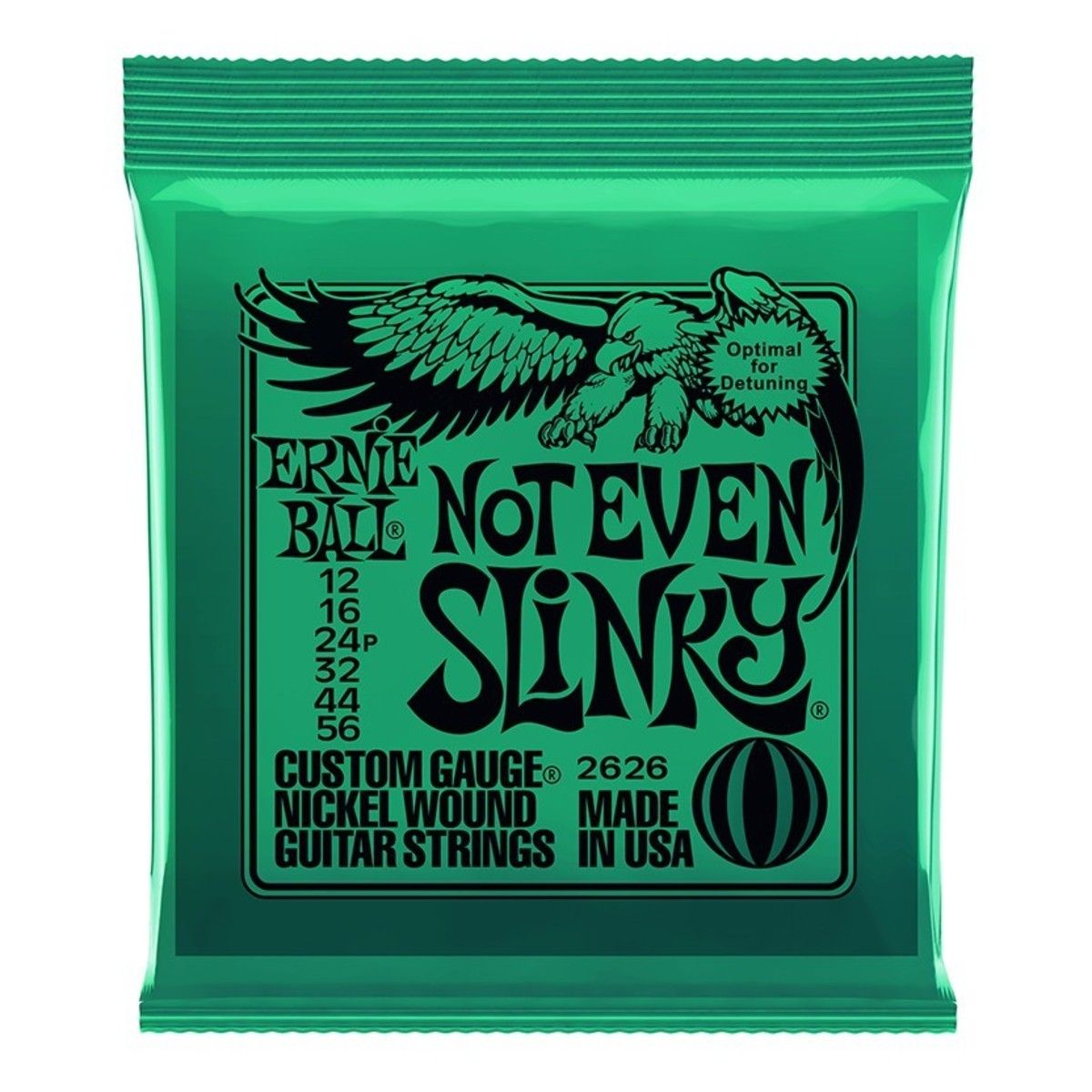
FEATURES: String Gauges: 12, 16, 24p, 32, 44, 56
OTHER INFO: Ultra-thick
Ernie Ball Not Even Slinky 2626 Nickel Guitar Strings 12-56
When you check the price above, you’ll see there are loads of great places to buy this item. Our personal favorite is Gear4music.
It is the largest music retailer in the UK and fast becoming the most respected online music shop in the US too. Their customer service is excellent, they have competitive prices, really fast shipping, and usually have the longest guarantee.
Most professional musicians use Gear4music, so there is no reason why you shouldn’t too!
- Great sound when playing chords and single notes.
- Retains tension even when tuning down to lower notes
- Smooth and fast action on high frets
- Lightweight yet durable construction
- Best for metal and rock music
- May be too heavy for some players.
The professional musician who wrote this article combined many things,
from the product build, manufacturer’s reputation through to feedback
from other users, to create our famous TedScore™.
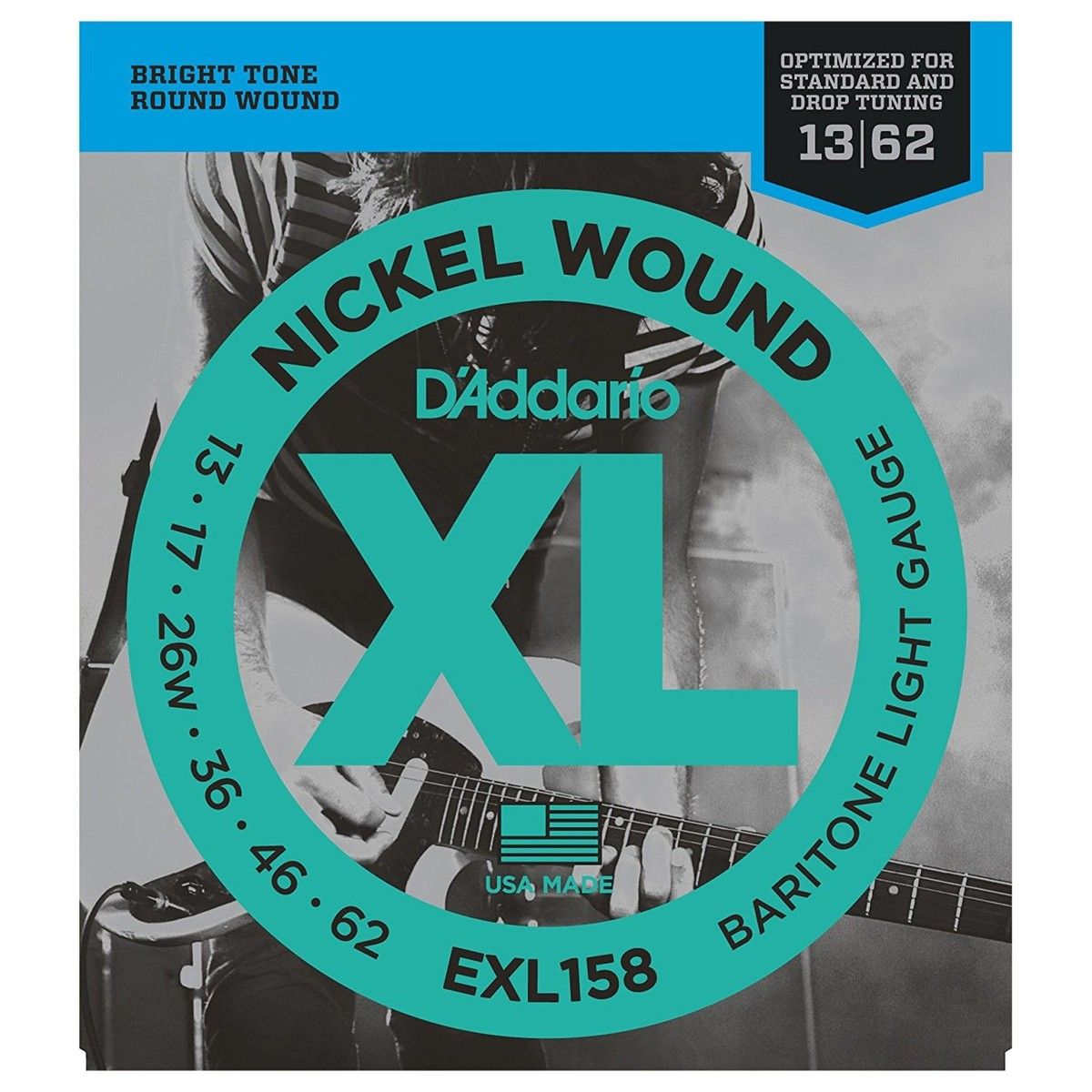
FEATURES: Hexagonally shaped, high carbon steel core
OTHER INFO: Plain Steel Gauges (.013, .017) and Nickel Wound Gauges (.026, .036, .046, .062)
Daddario EXL158 Nickel Wound Baritone Guitar Strings
When you check the price above, you’ll see there are loads of great places to buy this item. Our personal favorite is Gear4music.
It is the largest music retailer in the UK and fast becoming the most respected online music shop in the US too. Their customer service is excellent, they have competitive prices, really fast shipping, and usually have the longest guarantee.
Most professional musicians use Gear4music, so there is no reason why you shouldn’t too!
- Long-lasting and distinctive tone
- Bright sound with excellent intonation
- Comfortable to play
- Environmentally friendly packaging
- Perfect for all playing styles, including strumming, bending, fretting, and more
- May require a bit of an adjustment period.
The professional musician who wrote this article combined many things,
from the product build, manufacturer’s reputation through to feedback
from other users, to create our famous TedScore™.
Other Things to Consider When Choosing an Electric Guitar String
Some strings that may work well for one player may not be suitable for another. If you’re looking to find the perfect set of electric guitar strings, there are a few things that you should take into consideration when making your selection.
1. Material
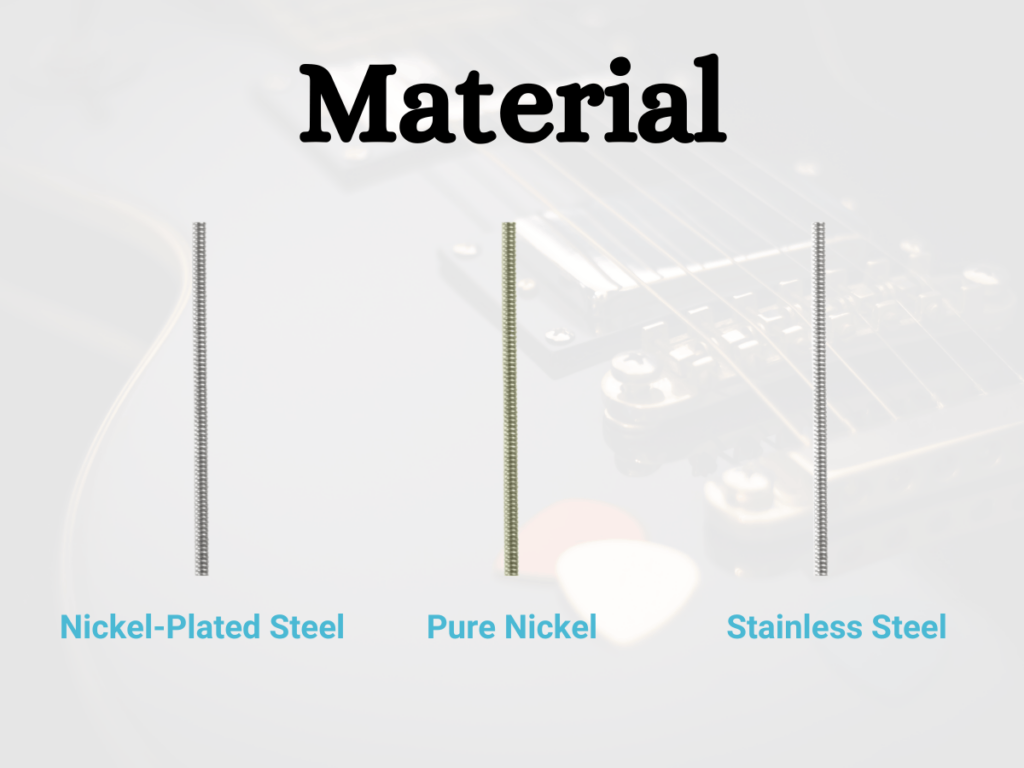
Electric guitar strings’ material significantly impacts the instrument’s tone and playability. Common materials include nickel, stainless steel, and pure nickel.
Nickel-plated steel is famous for its balanced, versatile tone and durability.
Stainless steel offers a brighter, punchier sound and is resistant to corrosion.
Pure nickel has a warm, vintage style for blues and jazz.
2. Winding
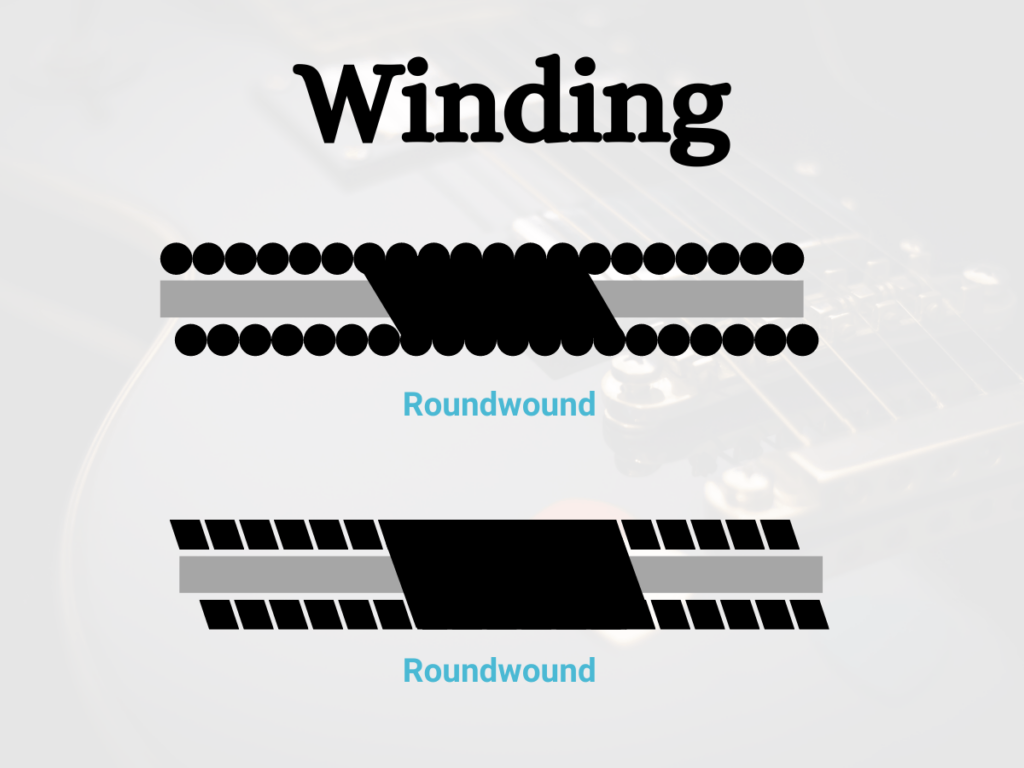
The winding process affects string flexibility and playability.
Roundwound strings give more definition to notes and chords, while flat-wound strings provide a smoother feel with less finger noise.
3. Coating
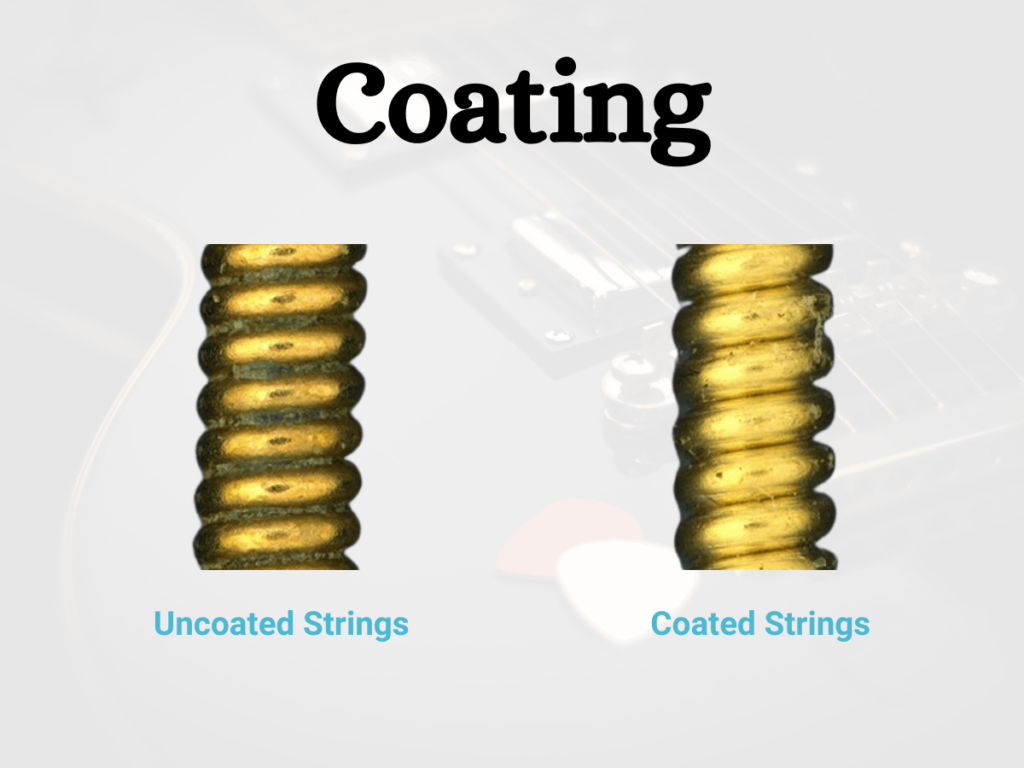
Some electric guitar strings have a protective coating to prevent corrosion from sweat and humidity. Coated strings last longer than non-coated ones but may not have the same bright tone.
However, advancements in coating technology have led to coated strings that maintain a vibrant tone while extending string life.
Best Gauge For Electric Guitar Strings
Summary
In conclusion, the best gauge for electric guitar strings depends on your playing style and preferences. Heavy-gauge strings are generally favored by rock and heavy metal players who require maximum power from their instrument when performing solos and rhythm parts.
Lighter-gauge strings provide a more flexible feel, ideal for blues, jazz, country, and other softer musical styles. Experimentation is the best way to determine which gauge of strings is right for you.
Have you tried out different gauges on your electric guitar?
If so, I’d love to hear about your experience!
Finally, check out my new article on ‘How Long Do Guitar Strings Last?‘.
FAQ's
The answer to this question largely depends on your preference and the style of music you play. Generally speaking, 9-gauge strings are lighter and easier to play for beginners. 10-gauge strings tend to have a thicker tone with more sustain but require more effort to fret the notes.
If you’re playing acoustic guitar, 10 gauge will usually be the better choice since they produce more volume and clarity than lighter gauge strings.
The most common electric guitar string gauge is 10-46, which means the first (thinnest) string is a 10, and the last (thickest) string is a 54. This is a great starting point for beginners, as it’s easier to play and produces excellent sound. For more experienced players, custom gauge sets are available that range from extra light (9-42) to extra heavy (11-56).
No, acoustic and electric guitar strings are not the same gauge. Acoustic guitars typically use heavier gauge strings than electric guitars since they require more tension to produce a louder sound with greater clarity. Electric guitar strings are usually lighter gauge since they don’t need as much tension to have a good sound.
The best way to determine the gauge of strings that will work best for your guitar is to consult a professional luthier or your local music store. They can help you choose the best string gauge for your instrument and playing style.
If you’re a beginner, starting with a lighter gauge set is generally best, as they are easier to play and require less effort. Light guitar strings also produce a brighter sound that can cut through the mix easily. As you become more experienced, you can experiment with different string gauge combinations to find one that suits your needs.










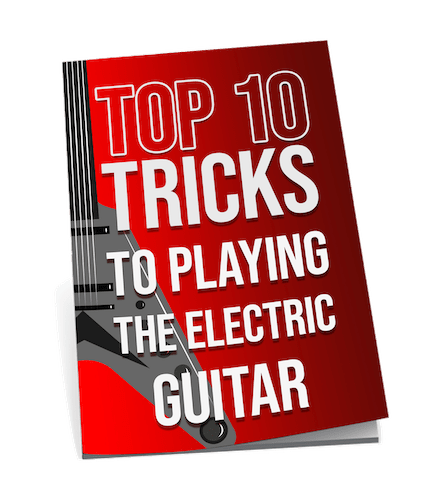
Loved the tips on string material and coating! It’s these little details that really fine-tune your tone.
It’s intriguing to note that while the article addresses string gauge, there’s an omission of the impact of scale length on string tension and subsequently on playability and tone. For instance, on a longer scale guitar, a heavy gauge string may produce a higher tension that’s suitable for lower tunings but may compromise playability for some. Understanding this balance is crucial for optimizing performance and comfort.
Heavy strings, because why make life easy? No pain, no gain, right guys?
not sure i agree with all the recs for heavy gauge strings here. i mean, i get where Toby is coming from, but sometimes you can get the same crunch and sustain with a good set of mediums. depends a lot on your setup and playing style.
I must disagree with the general sentiment that heavy gauge strings are universally the best for genres like jazz. Consider the nuanced tonal variations and the ability to bend notes effortlessly, which light to medium gauges offer. It’s those subtleties that often create the rich, emotive sound characteristic of jazz guitar.
Makes sense, JazzyJeff_88. Guess it really depends on what sound you’re going for. I’ve found mediums are great for blues for similar reasons.
This is an insightful guide. However, it’s important to note that the choice of gauge should also consider the player’s physical comfort and playing style, not just the genre of music.
I found the segment on medium gauge strings quite enlightening. It’s interesting how different genres call for different string types. Toby did a solid job highlighting the nuances.
heavy gauge strings are the only way to go for metal, nothing else gives that chunky riff feeling right.
just started using medium gauge after reading this, noticed the difference in the punchiness of my riffs which is cool. though, i miss how bendy the light strings felt, might go back or try out heavies maybe. anyone else felt the same switch vibes?
you think heavies would be too much for a newbie like me?
Mediums are my go-to for that exact reason, JJ. Give it some time, the trade-off in sound is worth it!
Hey Toby , got a question. For someone who’s used to playing punk but wanting to dabble in blues, would you say medium gauge is the way to go? Trying to find that sweet middle ground without buying a ton of different strings.
LizzyQ, definitely give medium gauge a shot. They’re versatile enough for both styles. You won’t regret it!